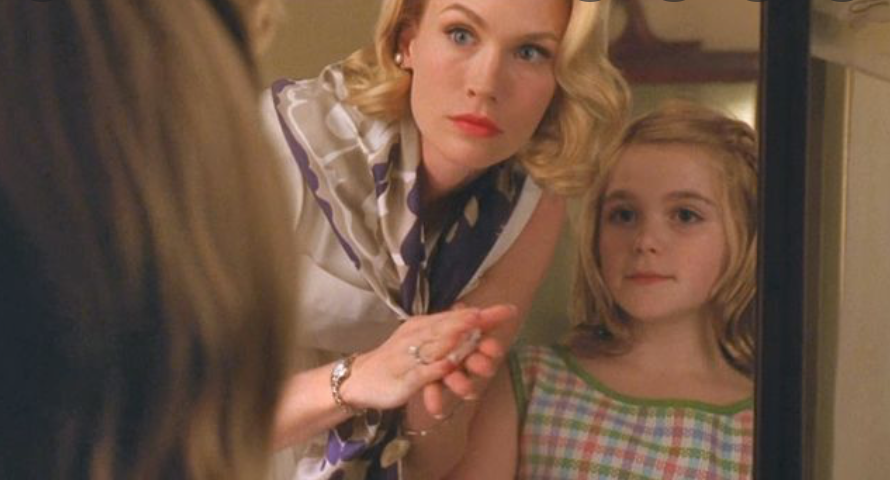There are numerous mothers in pop culture history with a bad rap. Mrs. Bates, Mrs. White, Mrs. Vorhees. But Betty Draper (January Jones) might be the most unfairly maligned of all of them. And January Jones herself recently pointed that out in a Mother’s Day photo tribute to Betty on Instagram, partially captioned that Betty was just “doing her best.” Isn’t that what every mother is doing, in the end? It’s not as though any matriarch is bequeathed with the same advantages starting out as a child’s father, who seems to be given the automatic badge of heroism simply for existing.
A mother, on the other hand, often has to work harder to win her children’s stamp of approval, let alone their affections. For she tends to be the figure in the permutation tasked with the role of “enforcer.” The quintessential “bad cop” to Daddy’s “good cop.” The latter being more prone to absenteeism and enabling behavior even in these post-Mr. Mom times.
Betty Draper was a prime example of this phenomenon, with Don (Jon Hamm) “allowed” the societal indulgence of doing whatever he wanted to as a man. Granted, Betty took out her own frustrations and resentments toward Don on their children, consisting of Sally (Kiernan Shipka) and Bobby (played by a few different people) during the early seasons before a third child named Gene was born (named after Betty’s father, Eugene [Ryan Cutrona]—perhaps further proof that kids, especially daughters, prefer their patriarch).
So sure, Betty was a bit childish herself. In large part thanks to her self-indulgent narcissism (such is the curse of beauty). She could be mean and callous at the drop of a hat, like when she forces Bobby to eat all the gumdrops (trading Betty’s sandwich for them) on a school picnic so he’ll feel sick. Yet that spiteful spirit could often serve as a display of motherly affection… like when she shoots her neighbor’s pigeons after said neighbor threatens to hurt Sally and Bobby’s dog for trying to go after his birds.
Her ways of showing that she cares might often be damaging, but they are there. Even if displayed in her own fucked-up “Betty way.” Take, for example, the reversal of her stance on Sally smoking. Where once she might have locked her in a closet for catching her only daughter with a ciggy, by season six, Betty seems all for sharing in some nicotine with her daughter, especially after Sally takes a drag and says, “My father has never given me anything.” For if Betty can bond over one thing with Sally, it’s contempt for Don. Even though Sally initially falls for her father’s “charming, perfect life” act with his new wife, Megan (Jessica Paré) for a while. A girl younger than Betty who lets Sally get away with far more—including dressing in go-go boots and a short skirt in season five, prompting Megan’s own dad to tell Don, “There’s nothing you can do. No matter what, one day your little girl will spread her legs and fly away.”
This was perhaps the cynical, grotesque thinking of Betty’s own father, a man who clearly never liked Don and who Betty ultimately never thought could compare to Eugene—at least not in terms of treating her like the “princess” she felt she deserved to be treated as. Betty’s overt jealousies of Sally stem from seeing Don lavish their daughter this way instead. And yes, maybe there’s a reason for the saying “Petty Betty” (à la Debbie Downer). Because that’s what she so often was. Yet one must consider her own set of tragic circumstances as she tried her best to navigate motherhood at a time when the only thing a woman was expected—permitted—to be was “pretty.” These being the “values” she was conditioned to pass down to her daughter.
Betty, however, learned quickly that Sally was never going to take up that mantle, this being yet another reason for their contentious rapport. Sally’s early signs of rebellion (e.g. masturbating at a sleepover) transformed into a keen aura of independence that could only spell a future that would be dictated by no man. At least, not in the way Betty had allowed her own life to be. The symbolism behind Betty’s death at the end of the 60s was a mirror for the fact that her traditionalism was a relic that couldn’t survive into the next decade. Instead, Sally would have to carry on a new torch in honor of her mother. One that would have nothing to do with vanity (till the very end, Betty played up her vain nature by carefully laying out instructions for what she should wear and how she should be made up for the casket). Or puerility.
So maybe Betty wasn’t the “best” mother. Or kindest. But when she was good—on those rare occasions when Mad Men let her be—she had the capacity to reveal a unique gentility belied by the fact that her “people were Nordic.” Therefore, stoic. And, if nothing else, her example underscored to Sally all the ways she did not want to be.






















